A Study of Occupational Hazards and Controls Among UK Pharma Workers
VerifiedAdded on 2020/06/06
|6
|998
|54
Report
AI Summary
This dissertation chapter focuses on identifying and analyzing occupational hazards, specifically psychological threats like stress and burnout, among healthcare workers (HCWs) in the UK pharmaceutical industry. It highlights the industry's significant contribution to the UK economy and the large workforce employed. The study aims to identify the psychological hazards, assess the causes of stress, and determine effective control measures. The research design involves an empirical study using a focus group interview to collect primary data from HCWs and secondary data from industry reports. The analysis will employ a qualitative method to evaluate the acquired information. The project outlines a timeline and references relevant literature on occupational health, hazard identification, and economic evaluation of healthcare programs, aiming to provide insights into improving worker well-being and safety within the pharmaceutical sector.
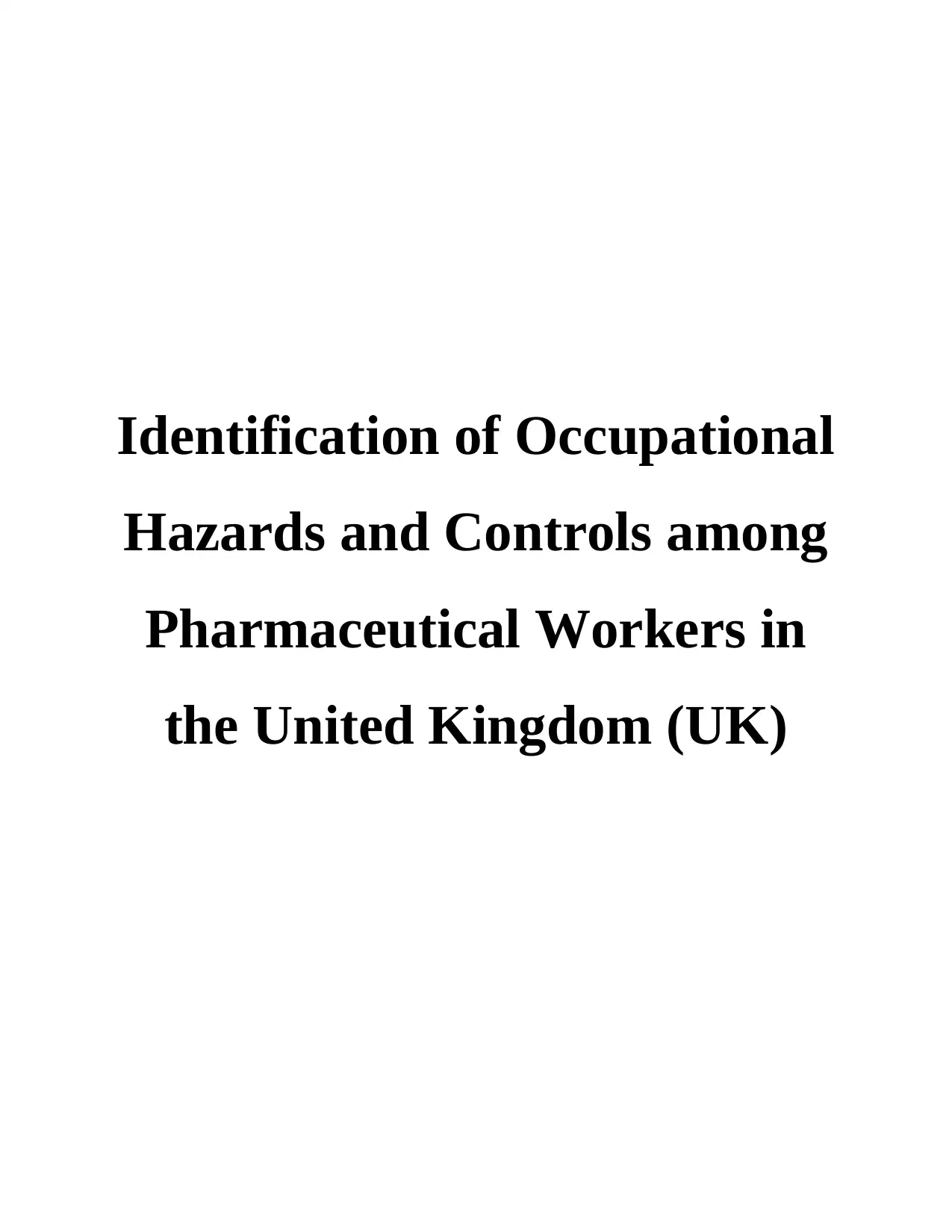
Identification of Occupational
Hazards and Controls among
Pharmaceutical Workers in
the United Kingdom (UK)
Hazards and Controls among
Pharmaceutical Workers in
the United Kingdom (UK)
Paraphrase This Document
Need a fresh take? Get an instant paraphrase of this document with our AI Paraphraser
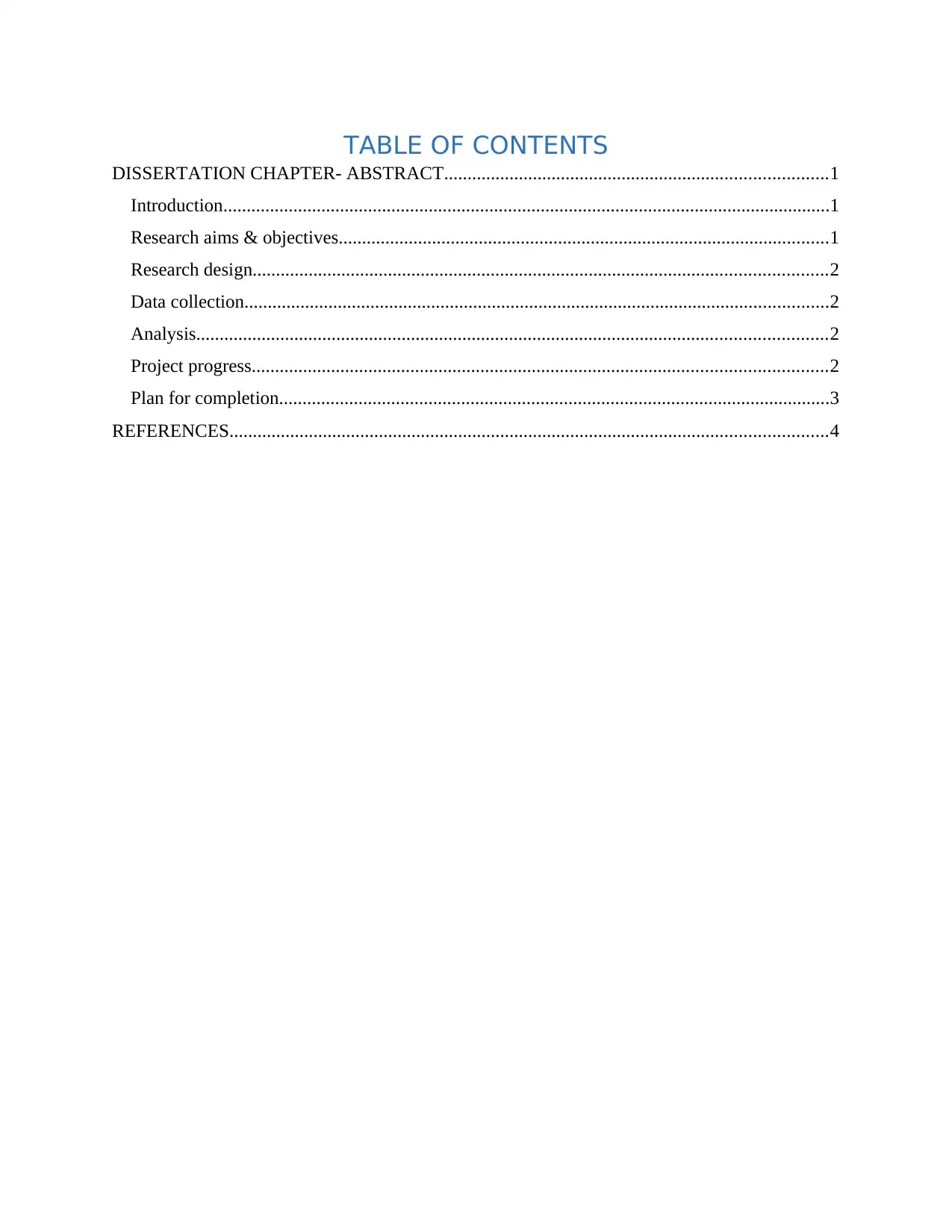
TABLE OF CONTENTS
DISSERTATION CHAPTER- ABSTRACT..................................................................................1
Introduction..................................................................................................................................1
Research aims & objectives.........................................................................................................1
Research design...........................................................................................................................2
Data collection.............................................................................................................................2
Analysis.......................................................................................................................................2
Project progress...........................................................................................................................2
Plan for completion......................................................................................................................3
REFERENCES................................................................................................................................4
DISSERTATION CHAPTER- ABSTRACT..................................................................................1
Introduction..................................................................................................................................1
Research aims & objectives.........................................................................................................1
Research design...........................................................................................................................2
Data collection.............................................................................................................................2
Analysis.......................................................................................................................................2
Project progress...........................................................................................................................2
Plan for completion......................................................................................................................3
REFERENCES................................................................................................................................4
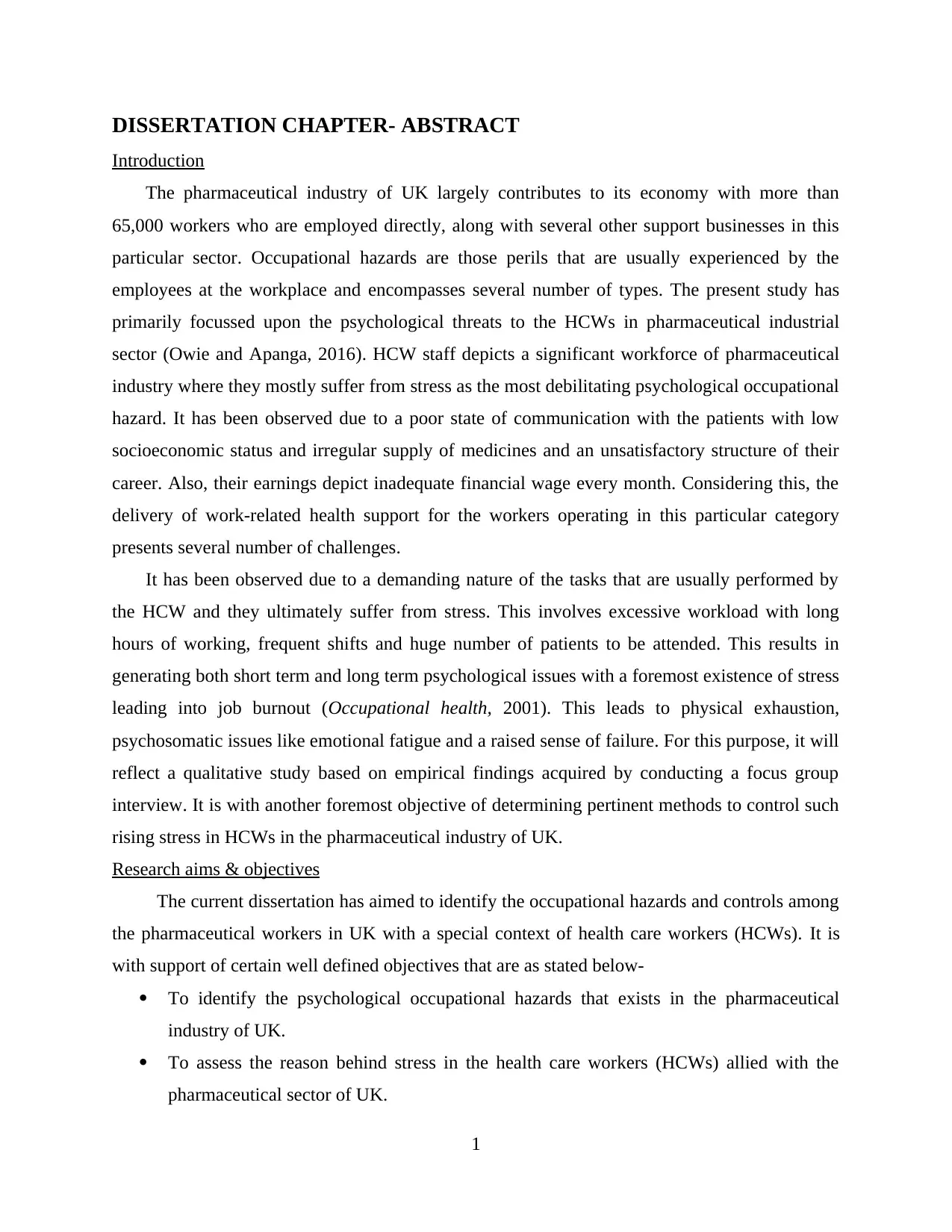
DISSERTATION CHAPTER- ABSTRACT
Introduction
The pharmaceutical industry of UK largely contributes to its economy with more than
65,000 workers who are employed directly, along with several other support businesses in this
particular sector. Occupational hazards are those perils that are usually experienced by the
employees at the workplace and encompasses several number of types. The present study has
primarily focussed upon the psychological threats to the HCWs in pharmaceutical industrial
sector (Owie and Apanga, 2016). HCW staff depicts a significant workforce of pharmaceutical
industry where they mostly suffer from stress as the most debilitating psychological occupational
hazard. It has been observed due to a poor state of communication with the patients with low
socioeconomic status and irregular supply of medicines and an unsatisfactory structure of their
career. Also, their earnings depict inadequate financial wage every month. Considering this, the
delivery of work-related health support for the workers operating in this particular category
presents several number of challenges.
It has been observed due to a demanding nature of the tasks that are usually performed by
the HCW and they ultimately suffer from stress. This involves excessive workload with long
hours of working, frequent shifts and huge number of patients to be attended. This results in
generating both short term and long term psychological issues with a foremost existence of stress
leading into job burnout (Occupational health, 2001). This leads to physical exhaustion,
psychosomatic issues like emotional fatigue and a raised sense of failure. For this purpose, it will
reflect a qualitative study based on empirical findings acquired by conducting a focus group
interview. It is with another foremost objective of determining pertinent methods to control such
rising stress in HCWs in the pharmaceutical industry of UK.
Research aims & objectives
The current dissertation has aimed to identify the occupational hazards and controls among
the pharmaceutical workers in UK with a special context of health care workers (HCWs). It is
with support of certain well defined objectives that are as stated below-
To identify the psychological occupational hazards that exists in the pharmaceutical
industry of UK.
To assess the reason behind stress in the health care workers (HCWs) allied with the
pharmaceutical sector of UK.
1
Introduction
The pharmaceutical industry of UK largely contributes to its economy with more than
65,000 workers who are employed directly, along with several other support businesses in this
particular sector. Occupational hazards are those perils that are usually experienced by the
employees at the workplace and encompasses several number of types. The present study has
primarily focussed upon the psychological threats to the HCWs in pharmaceutical industrial
sector (Owie and Apanga, 2016). HCW staff depicts a significant workforce of pharmaceutical
industry where they mostly suffer from stress as the most debilitating psychological occupational
hazard. It has been observed due to a poor state of communication with the patients with low
socioeconomic status and irregular supply of medicines and an unsatisfactory structure of their
career. Also, their earnings depict inadequate financial wage every month. Considering this, the
delivery of work-related health support for the workers operating in this particular category
presents several number of challenges.
It has been observed due to a demanding nature of the tasks that are usually performed by
the HCW and they ultimately suffer from stress. This involves excessive workload with long
hours of working, frequent shifts and huge number of patients to be attended. This results in
generating both short term and long term psychological issues with a foremost existence of stress
leading into job burnout (Occupational health, 2001). This leads to physical exhaustion,
psychosomatic issues like emotional fatigue and a raised sense of failure. For this purpose, it will
reflect a qualitative study based on empirical findings acquired by conducting a focus group
interview. It is with another foremost objective of determining pertinent methods to control such
rising stress in HCWs in the pharmaceutical industry of UK.
Research aims & objectives
The current dissertation has aimed to identify the occupational hazards and controls among
the pharmaceutical workers in UK with a special context of health care workers (HCWs). It is
with support of certain well defined objectives that are as stated below-
To identify the psychological occupational hazards that exists in the pharmaceutical
industry of UK.
To assess the reason behind stress in the health care workers (HCWs) allied with the
pharmaceutical sector of UK.
1
⊘ This is a preview!⊘
Do you want full access?
Subscribe today to unlock all pages.

Trusted by 1+ million students worldwide
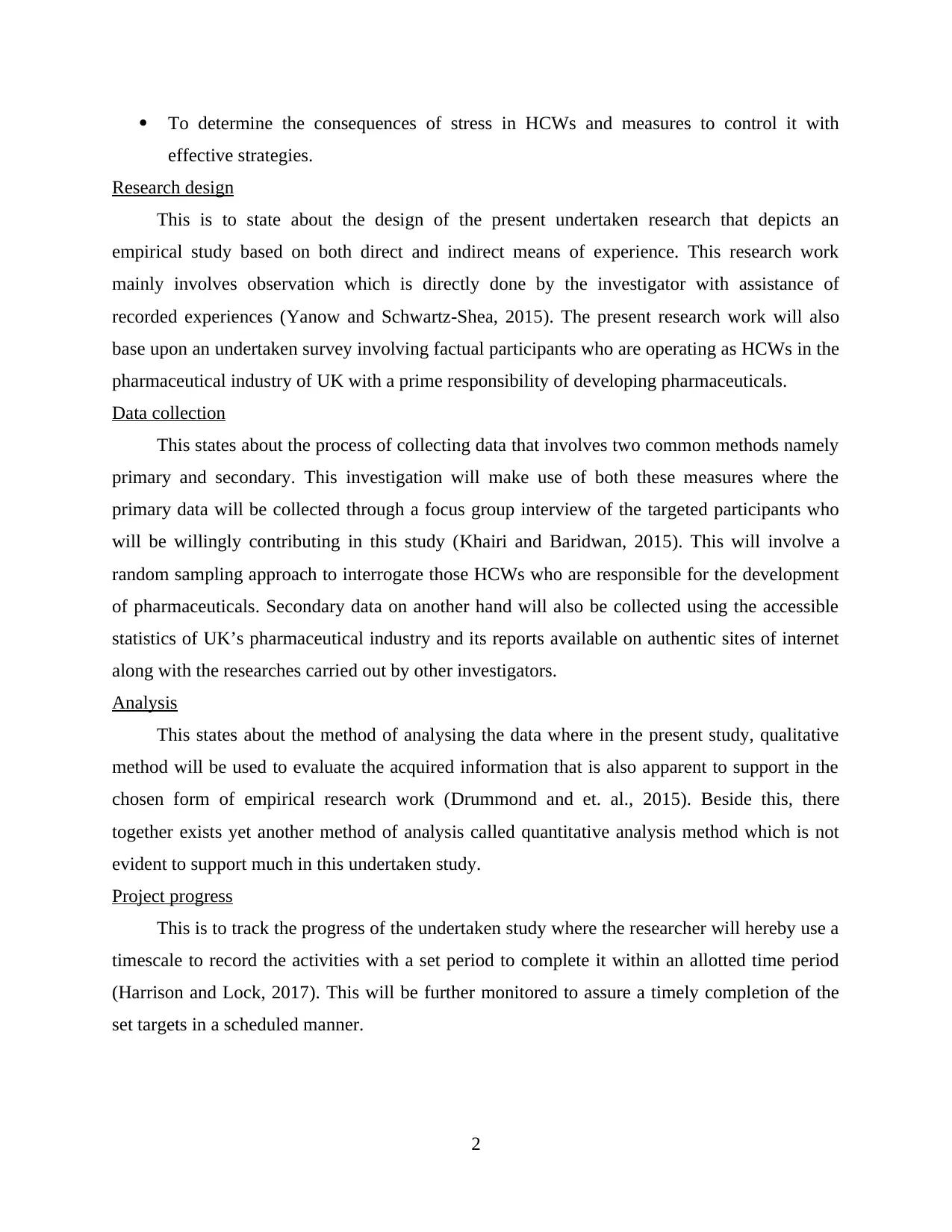
To determine the consequences of stress in HCWs and measures to control it with
effective strategies.
Research design
This is to state about the design of the present undertaken research that depicts an
empirical study based on both direct and indirect means of experience. This research work
mainly involves observation which is directly done by the investigator with assistance of
recorded experiences (Yanow and Schwartz-Shea, 2015). The present research work will also
base upon an undertaken survey involving factual participants who are operating as HCWs in the
pharmaceutical industry of UK with a prime responsibility of developing pharmaceuticals.
Data collection
This states about the process of collecting data that involves two common methods namely
primary and secondary. This investigation will make use of both these measures where the
primary data will be collected through a focus group interview of the targeted participants who
will be willingly contributing in this study (Khairi and Baridwan, 2015). This will involve a
random sampling approach to interrogate those HCWs who are responsible for the development
of pharmaceuticals. Secondary data on another hand will also be collected using the accessible
statistics of UK’s pharmaceutical industry and its reports available on authentic sites of internet
along with the researches carried out by other investigators.
Analysis
This states about the method of analysing the data where in the present study, qualitative
method will be used to evaluate the acquired information that is also apparent to support in the
chosen form of empirical research work (Drummond and et. al., 2015). Beside this, there
together exists yet another method of analysis called quantitative analysis method which is not
evident to support much in this undertaken study.
Project progress
This is to track the progress of the undertaken study where the researcher will hereby use a
timescale to record the activities with a set period to complete it within an allotted time period
(Harrison and Lock, 2017). This will be further monitored to assure a timely completion of the
set targets in a scheduled manner.
2
effective strategies.
Research design
This is to state about the design of the present undertaken research that depicts an
empirical study based on both direct and indirect means of experience. This research work
mainly involves observation which is directly done by the investigator with assistance of
recorded experiences (Yanow and Schwartz-Shea, 2015). The present research work will also
base upon an undertaken survey involving factual participants who are operating as HCWs in the
pharmaceutical industry of UK with a prime responsibility of developing pharmaceuticals.
Data collection
This states about the process of collecting data that involves two common methods namely
primary and secondary. This investigation will make use of both these measures where the
primary data will be collected through a focus group interview of the targeted participants who
will be willingly contributing in this study (Khairi and Baridwan, 2015). This will involve a
random sampling approach to interrogate those HCWs who are responsible for the development
of pharmaceuticals. Secondary data on another hand will also be collected using the accessible
statistics of UK’s pharmaceutical industry and its reports available on authentic sites of internet
along with the researches carried out by other investigators.
Analysis
This states about the method of analysing the data where in the present study, qualitative
method will be used to evaluate the acquired information that is also apparent to support in the
chosen form of empirical research work (Drummond and et. al., 2015). Beside this, there
together exists yet another method of analysis called quantitative analysis method which is not
evident to support much in this undertaken study.
Project progress
This is to track the progress of the undertaken study where the researcher will hereby use a
timescale to record the activities with a set period to complete it within an allotted time period
(Harrison and Lock, 2017). This will be further monitored to assure a timely completion of the
set targets in a scheduled manner.
2
Paraphrase This Document
Need a fresh take? Get an instant paraphrase of this document with our AI Paraphraser
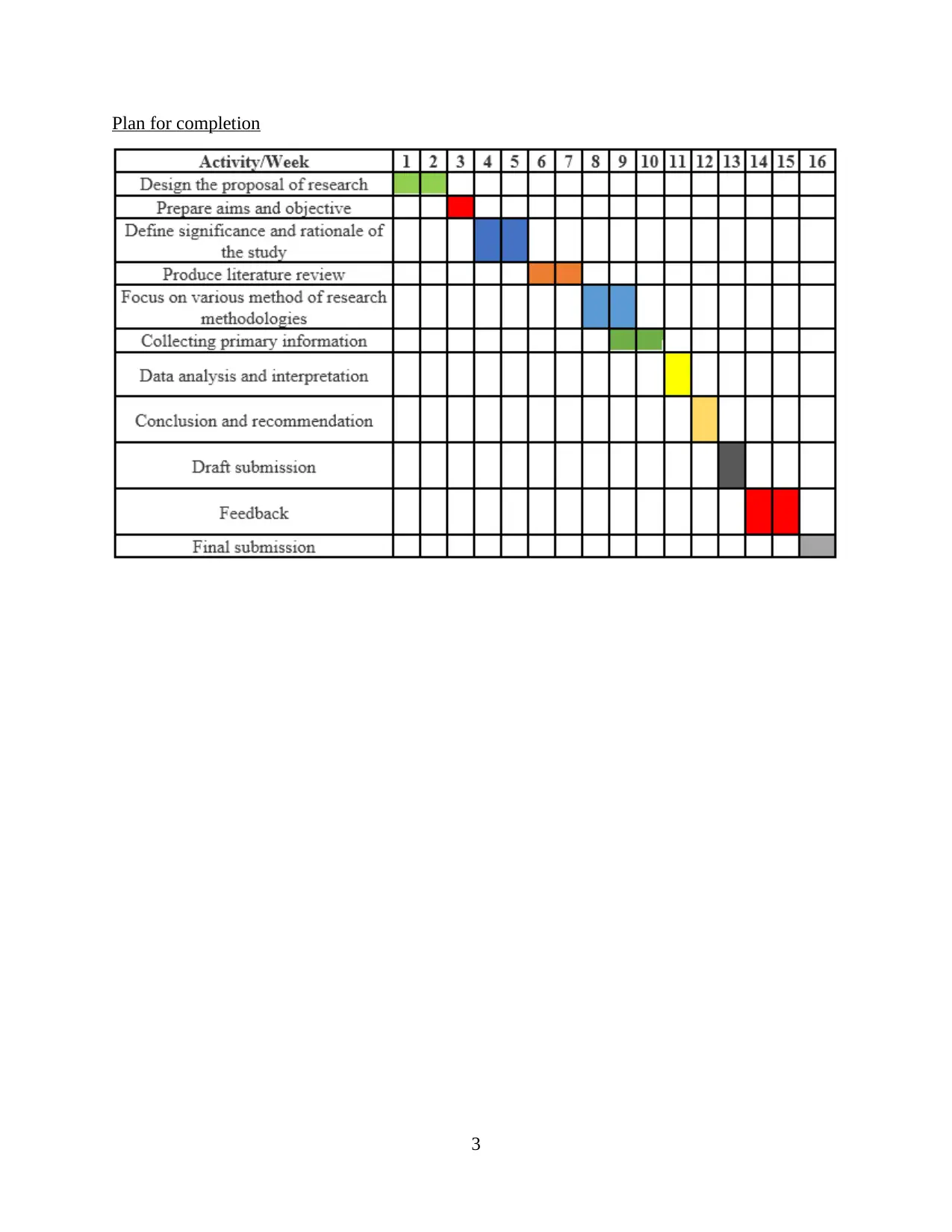
Plan for completion
3
3
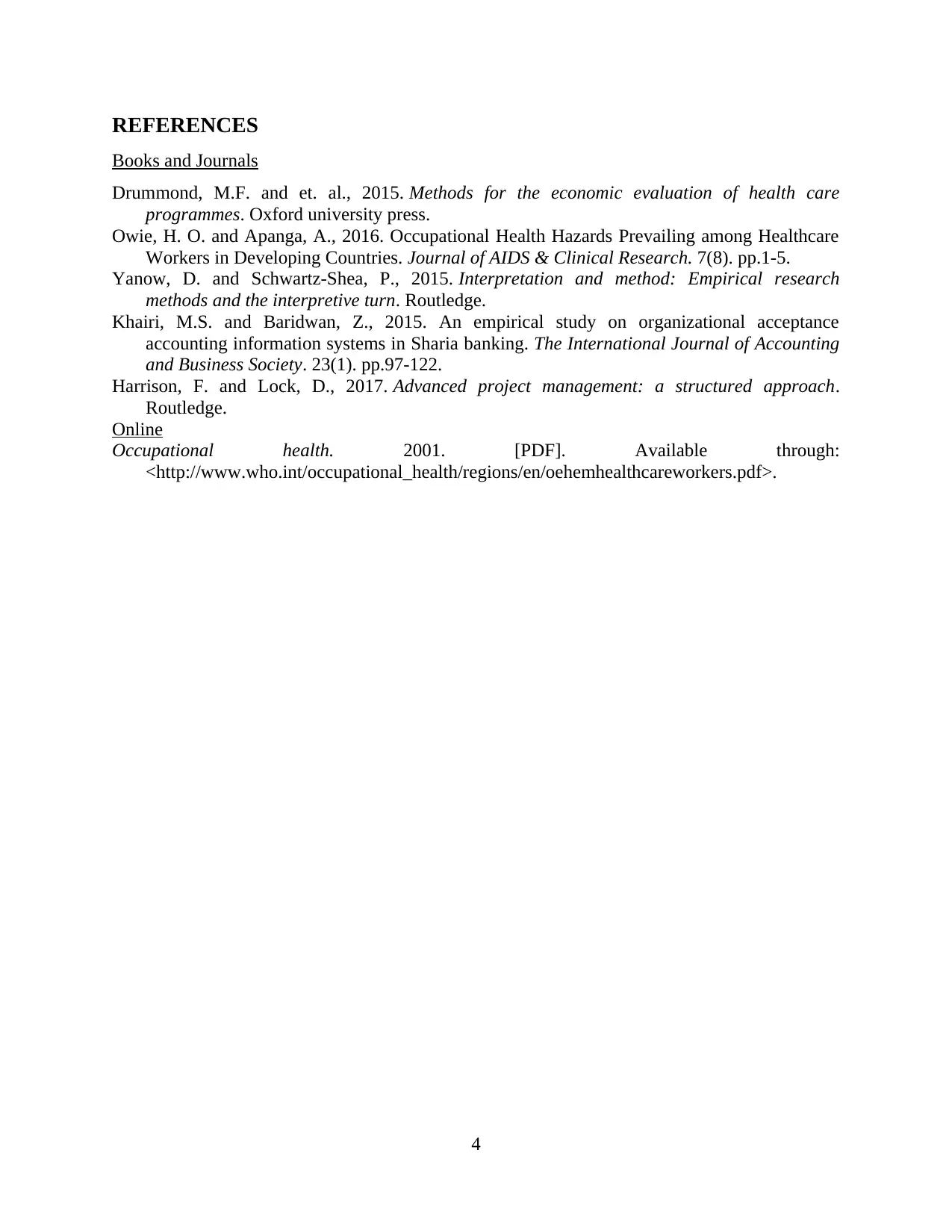
REFERENCES
Books and Journals
Drummond, M.F. and et. al., 2015. Methods for the economic evaluation of health care
programmes. Oxford university press.
Owie, H. O. and Apanga, A., 2016. Occupational Health Hazards Prevailing among Healthcare
Workers in Developing Countries. Journal of AIDS & Clinical Research. 7(8). pp.1-5.
Yanow, D. and Schwartz-Shea, P., 2015. Interpretation and method: Empirical research
methods and the interpretive turn. Routledge.
Khairi, M.S. and Baridwan, Z., 2015. An empirical study on organizational acceptance
accounting information systems in Sharia banking. The International Journal of Accounting
and Business Society. 23(1). pp.97-122.
Harrison, F. and Lock, D., 2017. Advanced project management: a structured approach.
Routledge.
Online
Occupational health. 2001. [PDF]. Available through:
<http://www.who.int/occupational_health/regions/en/oehemhealthcareworkers.pdf>.
4
Books and Journals
Drummond, M.F. and et. al., 2015. Methods for the economic evaluation of health care
programmes. Oxford university press.
Owie, H. O. and Apanga, A., 2016. Occupational Health Hazards Prevailing among Healthcare
Workers in Developing Countries. Journal of AIDS & Clinical Research. 7(8). pp.1-5.
Yanow, D. and Schwartz-Shea, P., 2015. Interpretation and method: Empirical research
methods and the interpretive turn. Routledge.
Khairi, M.S. and Baridwan, Z., 2015. An empirical study on organizational acceptance
accounting information systems in Sharia banking. The International Journal of Accounting
and Business Society. 23(1). pp.97-122.
Harrison, F. and Lock, D., 2017. Advanced project management: a structured approach.
Routledge.
Online
Occupational health. 2001. [PDF]. Available through:
<http://www.who.int/occupational_health/regions/en/oehemhealthcareworkers.pdf>.
4
⊘ This is a preview!⊘
Do you want full access?
Subscribe today to unlock all pages.

Trusted by 1+ million students worldwide
1 out of 6
Related Documents
Your All-in-One AI-Powered Toolkit for Academic Success.
+13062052269
info@desklib.com
Available 24*7 on WhatsApp / Email
![[object Object]](/_next/static/media/star-bottom.7253800d.svg)
Unlock your academic potential
Copyright © 2020–2026 A2Z Services. All Rights Reserved. Developed and managed by ZUCOL.





